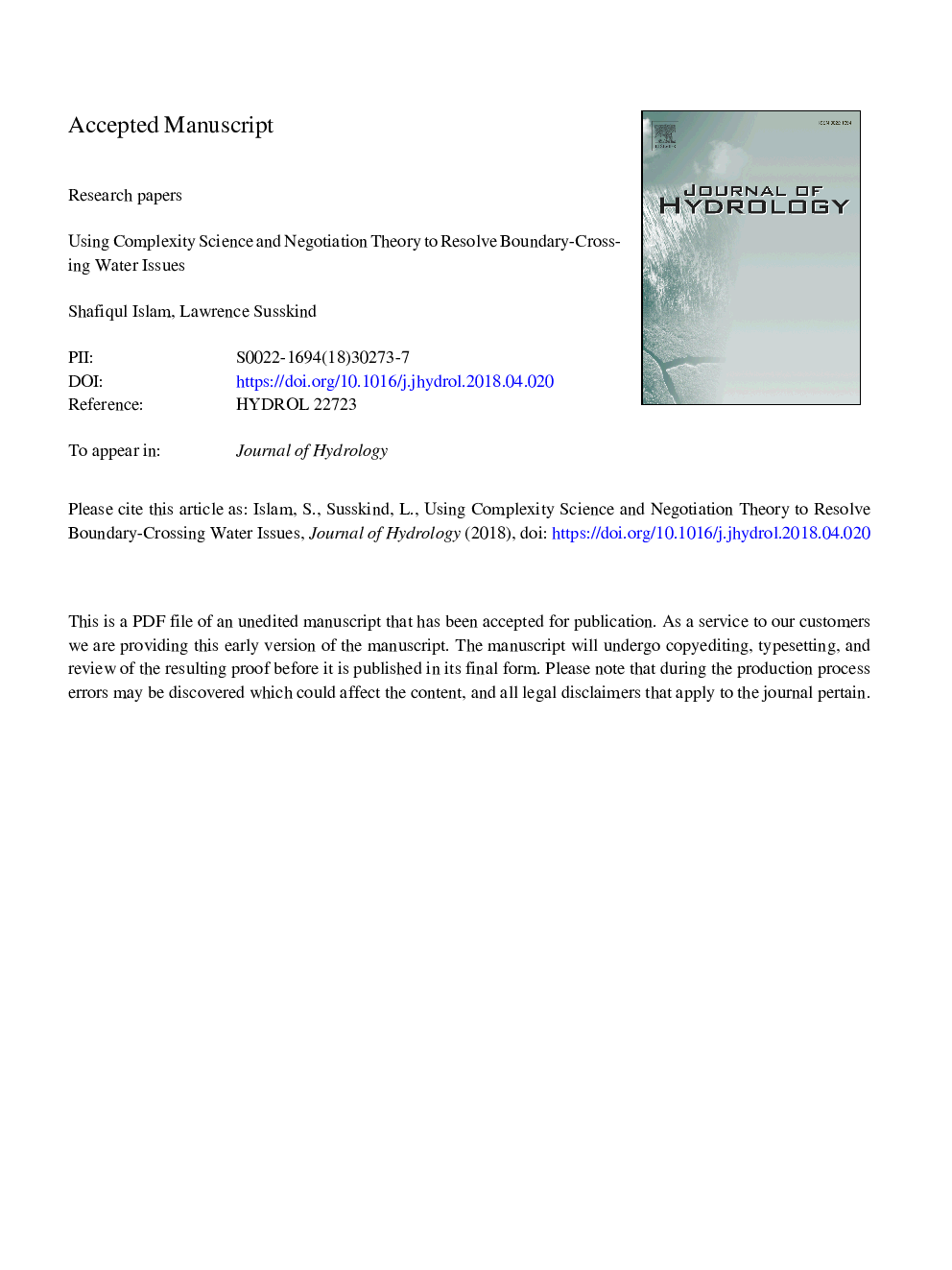| کد مقاله | کد نشریه | سال انتشار | مقاله انگلیسی | نسخه تمام متن |
|---|---|---|---|---|
| 8894686 | 1629892 | 2018 | 55 صفحه PDF | دانلود رایگان |
عنوان انگلیسی مقاله ISI
Using complexity science and negotiation theory to resolve boundary-crossing water issues
ترجمه فارسی عنوان
استفاده از نظریه پیچیدگی و نظریه مذاکرات برای حل مسائل مربوط به عبور از مرز
دانلود مقاله + سفارش ترجمه
دانلود مقاله ISI انگلیسی
رایگان برای ایرانیان
کلمات کلیدی
پیچیدگی، دیپلماسی آب مذاکره،
ترجمه چکیده
بسیاری از مسائل مدیریت و مدیریت آب پیچیده است. پیچیدگی این مسائل مربوط به عبور از مرزهای چندگانه است: سیاسی، اجتماعی و قضایی، و همچنین فیزیکی، زیست محیطی و زیست شناسی. حل و فصل این مسائل معمولا به تعاملات بسیاری از احزاب با ارزش ها و منافع متناقض در سراسر مرزها و مقیاس های متعدد برای تصمیم گیری نیاز دارد. وابستگی متقابل و بازخورد در میان متغیرهای تعاملی، فرایندها، بازیگران و موسسات دشوار است و پیش بینی آنها مشکل است. بنابراین، تصمیم گیری مربوط به مشکلات پیچیده آب نیاز به مشروعیت و سازگاری دارد. این مقاله بر مبنای تعدادی از ایده ها از علم پیچیدگی و نظریه مذاکرات است که می تواند به پیچیدگی و مشکلات مدیریت اختلافات آب و هوایی مرزی رسیدگی کند. آن را با چارچوب دیپلماسی آب آغاز می کند که طی چند سال گذشته توسعه یافته و آزمایش شده است. سپس، آن را از سه ایده کلیدی از علم پیچیدگی (وابستگی متقابل و وابستگی، عدم اطمینان و بازخورد؛ ظهور و انطباق) و سه نظریه مذاکرات (شناسایی و مشارکت ذینفع، یافتن حقایق مشترک و ایجاد ارزش از طریق تولید گزینه) استفاده می کند تا نشان دهد که چگونه کاربرد این ایده ها می تواند به افزایش اثربخشی مدیریت آب کمک کند.
موضوعات مرتبط
مهندسی و علوم پایه
علوم زمین و سیارات
فرآیندهای سطح زمین
چکیده انگلیسی
Many water governance and management issues are complex. The complexity of these issues is related to crossing of multiple boundaries: political, social and jurisdictional, as well as physical, ecological and biogeochemical. Resolution of these issues usually requires interactions of many parties with conflicting values and interests operating across multiple boundaries and scales to make decisions. The interdependence and feedback among interacting variables, processes, actors and institutions are hard to model and difficult to forecast. Thus, decision-making related to complex water problems needs be contingent and adaptive. This paper draws on a number of ideas from complexity science and negotiation theory that may make it easier to cope with the complexities and difficulties of managing boundary crossing water disputes. It begins with the Water Diplomacy Framework that was developed and tested over the past several years. Then, it uses three key ideas from complexity science (interdependence and interconnectedness; uncertainty and feedback; emergence and adaptation) and three from negotiation theory (stakeholder identification and engagement; joint fact finding; and value creation through option generation) to show how application of these ideas can help enhance effectiveness of water management.
ناشر
Database: Elsevier - ScienceDirect (ساینس دایرکت)
Journal: Journal of Hydrology - Volume 562, July 2018, Pages 589-598
Journal: Journal of Hydrology - Volume 562, July 2018, Pages 589-598
نویسندگان
Shafiqul Islam, Lawrence Susskind,
